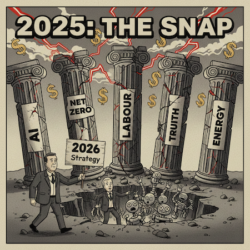- Can politicians sell austerity anymore?
- Too much debt for a turnaround?
- Why the Conservatives will stage a stunning comeback
Politicians are back to spending like drunken sailors with access to counterfeit money. Despite bond markets warning them loud and clear not to.
US federal government spending is up $391 billion from a year ago. The US deficit is blowing out like the country is at war, despite tariffs. They’ve even had to shut the government down to slow the runaway train.
Germany finally has a sensible centre-right-wing government to get things back on track. But it has spending plans that’d make a Greek blush. Chancellor Merz had to remove the debt brake to get his gargantuan spending plans through. Those plans just got approved by the German parliament.
This is what happens when the German Bundesbank doesn’t have the power to pull the plug on the country’s politicians.
Japan’s new Prime Minister reckons she’s a fan of Margaret Thatcher. But she’s planning to spend like a Peronista. The previous Prime Minister’s record-breaking planned spend wasn’t enough.
Worst of all, Takaichi is planning on “the state proactively providing financial support to essential sectors to minimise risks to our nation.” These sectors include food and energy.
We all know what happens when a government gets involved in a sector of the economy. No wonder so many people grow their own food on small plots here in Japan. We have a wood burning stove when the Japanese energy crisis hits…
The French finances are so badly out of control that nobody can stay in government. Even Madame Lagarde doesn’t want to get involved.
In the UK, each move in the bond market triggers calls for another resignation. Nigel Farage’s economic policies don’t seem to be tallying up to austerity either.
Quite frankly, if Elon Musk and Doge can’t pull off spending cuts, who can? Javier Milei is struggling too.
This begs the question whether the political shift to the right so many are so desperate for will actually change much of anything.
Can politicians sell austerity anymore?
We like to say it’s impossible. It certainly seems unimaginable. But a surprising number of politicians have managed it in the past…
I was in Limerick in 2016, visiting my sister’s godmother. As all good Irish stories begin, we were in a pub. I noticed that Ireland’s former finance minister was sitting behind me – within arm’s reach.
The architect of the country’s austerity didn’t need a bodyguard. Everyone knew where he lived, too, my friends told me. And it’s not like the country is a stranger to political violence…
Yet Ireland pulled off austerity with impressive stability.
My sister’s godmother urged me to chat to Noonan. But I was too shy, believe it or not.
The Swedes managed a similarly austere form of austerity in the 90s. I don’t know much about how. But the country didn’t tear itself apart over the cuts.
Denmark’s pension age is rising to 70 without revolts.
Prime Minister Callahan talked the talk in his Blackpool speech. But it took Thatcher to actually make the cuts in the UK. That didn’t go down so well…
In fact, the further south-east you go in Europe, the worse the reaction to austerity.
The Greeks, having had the longest experience with democracy, know it’s just a ruse to bleed your fellow taxpayers dry. Better that than the other forms of government which bleed you dry in a more literal sense, of course.
But the point is that some countries really can turn the ship around. So, why are governments increasing speed instead?
Too much debt for fiscal stimulus to work
The idea of spending more government money is that it creates fake economic growth. The upsides show up in jobs, GDP and other government statistics designed to make the government look good for elections.
All the downsides show up in the future. But we can measure them in the form of debt.
Eventually, “you run out of other people’s money,” Thatcher explained. The question is always whether you take action before or after this embarrassing moment.
You get helpful hints that something is going terribly wrong along the way. Like when your 30-year bond yield hits a record high. As just occurred in Japan…
Or when your bond prices plunge because you can’t keep a government in office for more than a few weeks. As happened to the UK 3 years ago and France this week.
The big question investors must ask themselves is how delusional our governments can possibly be to spend more when their bond markets are already wobbling badly enough to fire Prime Ministers. Why are they playing chicken with the bond market?
The answer may be something called “fiscal fatalism”. At least, I call it that.
The idea is fairly simple. The current financial system may be destined for a spectacular implosion. But it’s also responsible for delivering a truly vast boom in living standards, wealth and quality of life.
What would our housing stock look like if we didn’t have suspiciously good access to suspiciously cheap mortgages? What would our consumer spending look like without credit cards clogging up mailboxes? What would government services look like if budgets had to be balanced, let alone debt paid down?
What would our lifestyles look like if we couldn’t fund everything with debt, comfortable with the knowledge that the central bank will bail us out in a crisis by cutting rates?
Imprudence delivers a boom before the bust…
We might as well ride this central-bank-run fiat system for all its worth!
Let the spending boom continue while we can find someone stupid enough to lend us the money. (Your pension fund, bank and central bank.)
I’m not sure Fiscal Fatalism has taken hold just yet. But it’s the only explanation I can come up with for the deficit spending breaking out around the world.
And so I have two predictions for you…
First, the Conservatives will make a stunning comeback as the only party that can sell a plausible austerity.
And second, investing overseas will be the smart move as the UK goes through that austerity.
Here’s how you can make the jump right now.
Until next time,

Nick Hubble
Editor at Large
P.S. If Fiscal Fatalism really is what’s driving global policy, then it’s not just about preparing for austerity—it’s about profiting from the chaos before it hits. The “Wealth Window” shows you exactly how to do that. It’s not just smart…it may be essential if the bond market finally says “enough.” You can get all the details here.




